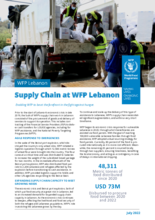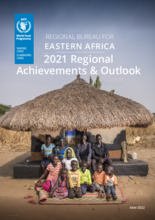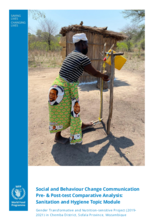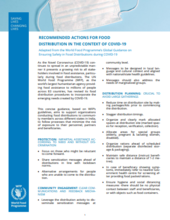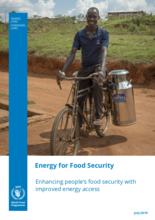Food safety and quality
- 90
- food specifications set WFP’s food safety and quality standards
- 15
- compulsory analyses are required for WFP foods
- Millions
- of beneficiaries receive safe, nutritious food thanks to food safety and quality measures
Working every day in 80 countries to bring food assistance to millions of children, women and men, the World Food Programme (WFP) must ensure that the food it delivers is safe, nutritious and of good quality. Vigilance is all the more important given the often harsh conditions we operate in. The food we distribute travels long distances by road, sea and air, and ideal storage environments can be difficult to guarantee.
With the expertise of highly specialized staff, WFP oversees the safety and quality of its food at every step along the supply chain – from production to processing and packaging; from storage and handling to distribution. While the health of the people we serve is our main concern, we also have a responsibility to ensure our donors’ contributions are used to buy good, nutritious food and that the way it is handled and delivered will preserve its quality.
What the World Food Programme is doing to ensure food safety and quality
-
Quality management
-
WFP experts constantly review and update over 90 food specifications, which provide guidance to WFP supply chain staff and to current and potential suppliers. To verify compliance with our food safety and quality standards, an average of 15 compulsory analyses is required. Factories, laboratories and inspection companies are frequently audited to ensure the people we serve receive safe, quality and nutritious foods.
-
Emergency operations
-
In emergency contexts, WFP experts rely on existing regulatory frameworks and assess risks as well as the capacity of local producers and suppliers to meet food safety and quality standards.
-
Incident management
-
Any food suspected of not meeting WFP quality standards is immediately withdrawn from distribution. Lessons learned from actual or suspected quality incidents lead to action such as the tightening of specifications and supplier screening procedures, the reduction of a product’s shelf life, or the strengthening of suppliers’ quality control systems.
-
Capacity strengthening
-
WFP engages with local companies to assess the possibility of producing processed foods in-country. WFP screens suppliers based on procurement and food safety and quality criteria and – after awarding them contracts – audits them with a view to improve the safety and quality of their produce.
-
Quality control
-
As well as auditing suppliers directly, WFP works with companies providing inspection services and reviews their performance against contractual key performance indicators.


